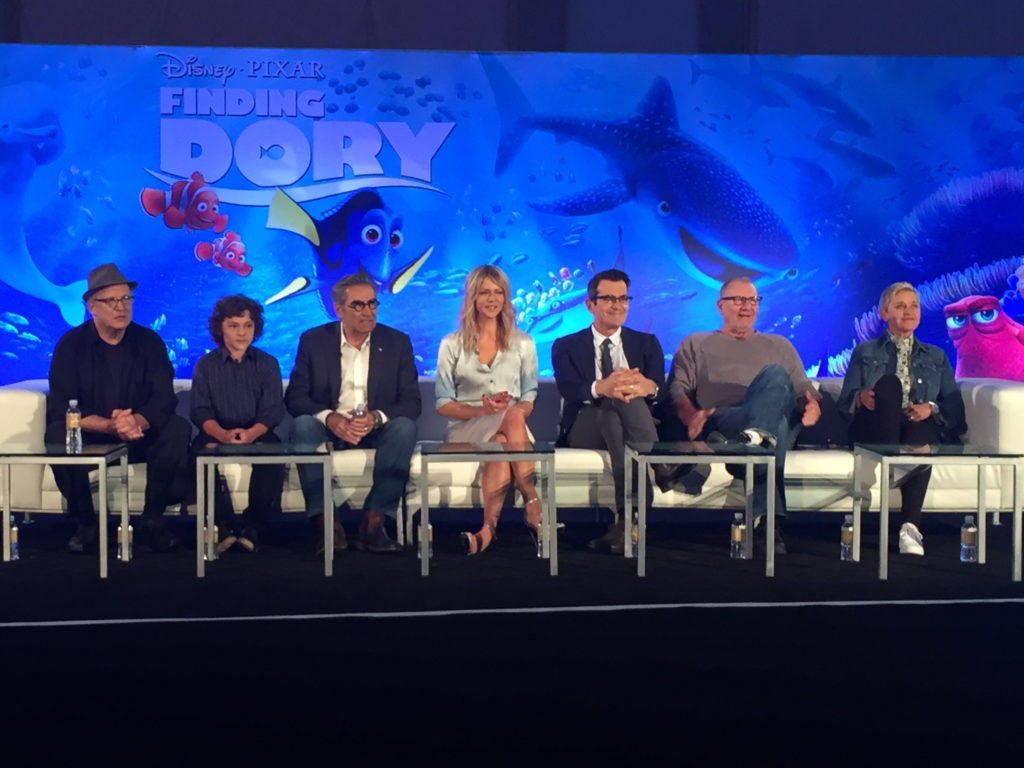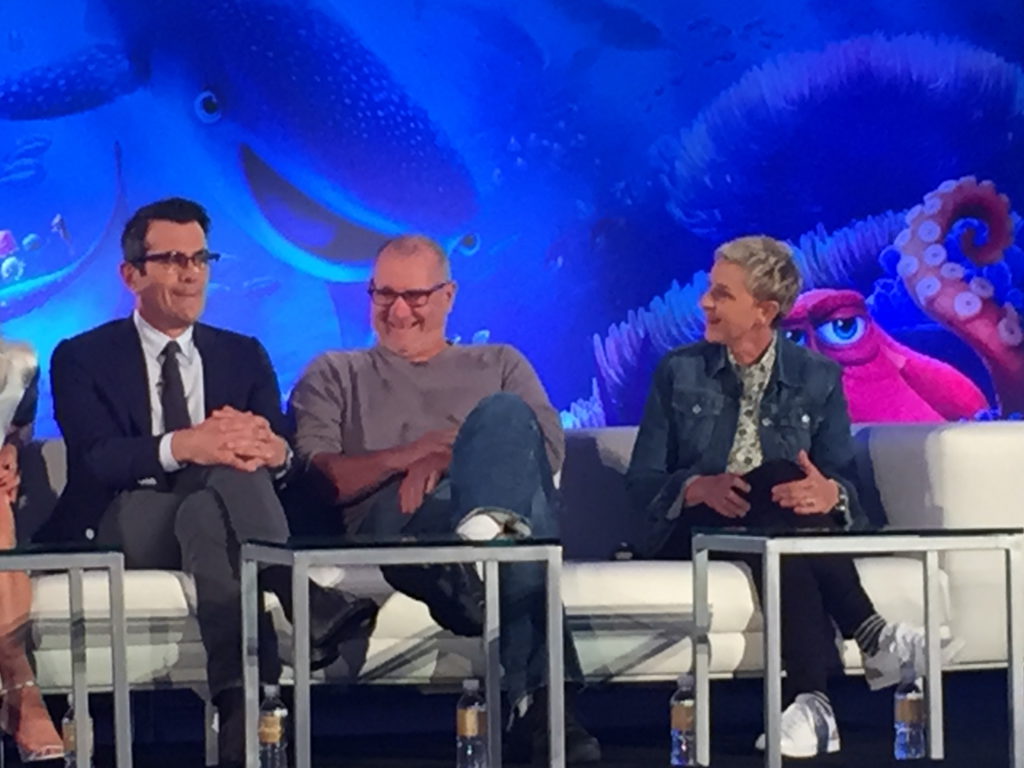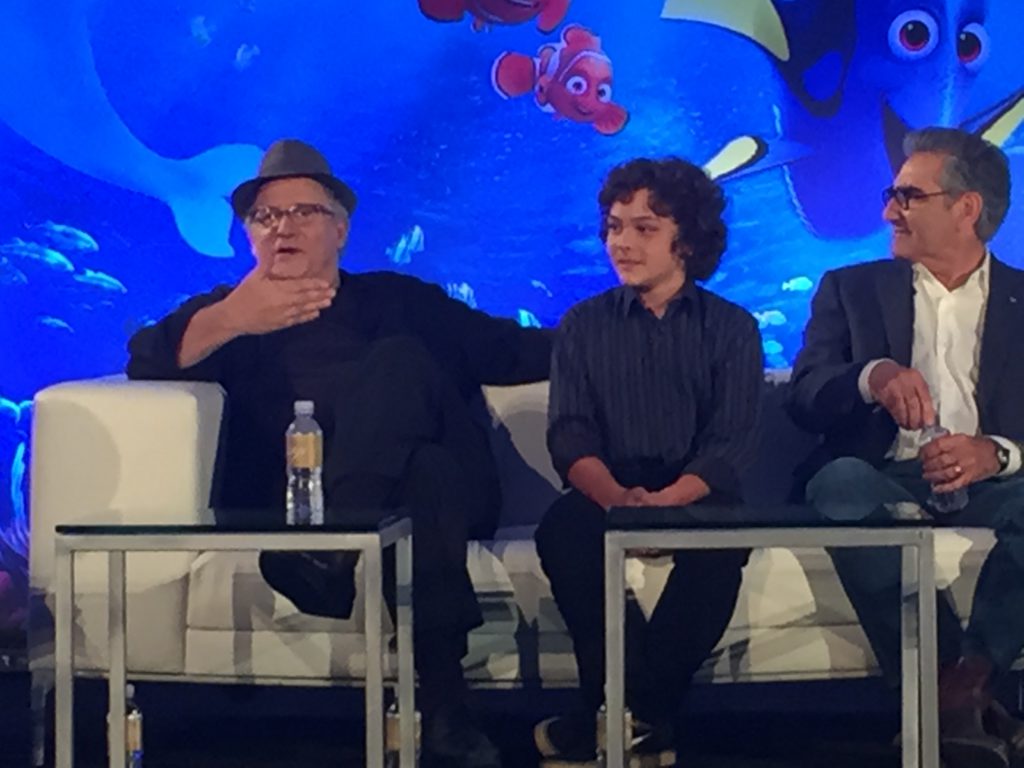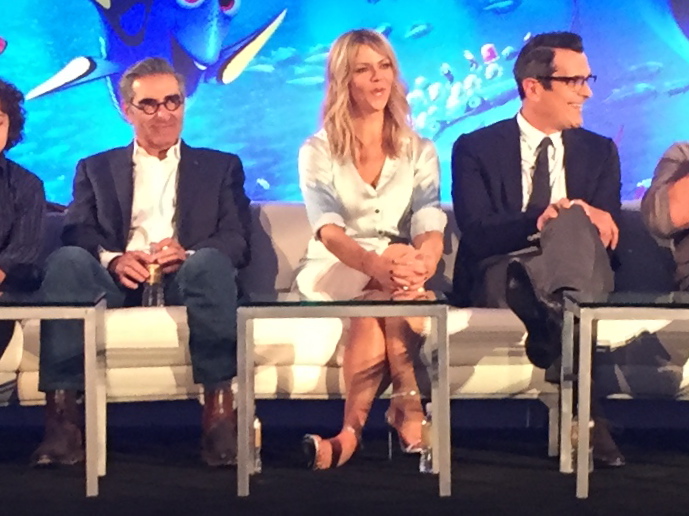Pixar has an embarrassment of riches in the voice acting pool for Finding Dory. One could cast at least three feature films and a couple of animated series from the crew that recently assembled to discuss their roles in the new release. Present for the session were Ellen DeGeneres (Dory), Ed O’Neill (Hank the octopus), Ty Burrell (Bailey the beluga whale), Kaitlin Olson (Destiny the whale shark), Albert Brooks (Marlin), Eugene Levy (Charlie, Dory’s father), and Hayden Rolence (Nemo).
For whatever reason, the first thing brought to the table was the controversy over the presence of two women in the film. It seems that the pair made a brief appearance in an early trailer, leading to speculation that Pixar was introducing the first same-sex couple in a feature animated film. Ellen admitted she had heard about this, and had been watching closely to see if she could spot them. Her reaction? “One woman has a very bad, short haircut, which,” she complained, “I find very offensive.” She went on to joke, “If that’s the definition of a gay woman, then… how dare you!”
Having brushed that aside, the cast took on the next topic: Going with the flow, like Dory, or planning ahead, like Marlin. Albert Brooks and Hayden Rolence (Marlin and Dory) claimed to be planners. Eugene Levy liked to think of himself as a go with the flow type, but knew better. Kaitlin Olson’s reply was tempered by recent motherhood. Once a planner, she now claimed to be an anxiety ridden control freak planner. Ty Burrell, on the other hand, said he was neither, which made him a worried person without a plan. Ed O’Neill elaborated on that, saying he also did not plan, and did not go with the flow, leaving him mostly confused. His method: Get up in the morning and just put one foot in front of the other. When Ellen stated that she was “pretty much” a planner, Brooks concluded that, for him, there really is no “flow,” that if you don’t plan you will flow right out the door.
Short-term memory loss was a natural subject for the group. Ellen said it wasn’t an issue for her as she takes ginko biloba, when she remembers. Her preference was living in the moment anyway. While Brooks was grateful for his great memory, he has developed a new philosophy in life. If something is bothering him, he said, he sets it aside for 30 minutes. Then, when he returns to it, he sees if it still bothers him.
Ellen was asked how serious her campaign to make the sequel had been. Her immediate response: “I am responsible for every penny this film makes.” After thanking God she had a talk show to spread the word, she admitted that it started out kind of serious, and then was really just a running joke. She certainly had not intended the sequel to be a starring vehicle for Dory. But, since director Andrew Stanton had described Hank as the “Dory” of the sequel, Ellen promised there would be a similar campaign for his movie. O’Neil mused that perhaps we would find out from “young Hank” why his character hates the ocean—what bad experience had left him craving life in the Aquarium.
The cast was asked to comment on playing fish. Burrell volunteered that he lost 75 pounds to play Bailey, the beluga whale with impaired echolocation. He then described his elaborate preparation, culminating in a special voice he created for the role. Following his first recording session, director Stanton nicely asked him to just use his own voice and not over think it. Brooks claimed that they prepared Hayden Rolence to play the new Nemo by keeping him in a tank for six months. (And that we would hear all the details in the lawsuit.) For his part, Rolence expressed his concern at taking over a character that people loved. Fortunately, he was already a big fan of the original Finding Nemo, and was thrilled to get the part.
Brooks recalled that he didn’t actually get to work much with Rolence while making the film. “He was on special child hours,” he said. Ellen and Eugene Levy (playing Dory’s father, Charlie) had a similar experience with their scenes, including the reunion that features prominently in the story. The scene is written for three (Diane Keaton plays Jenny, Dory’s mother), but each actor recorded their dialogue separately. Both actors stated that this was not as hard as one would think, though Levy said his first reading of the script had him welling up a couple of times. (It is a Pixar movie, after all.) They knew they could rely on their director, and they trusted the writing to deliver the message of the film. “Everyone is searching for home,” Ellen concluded.




